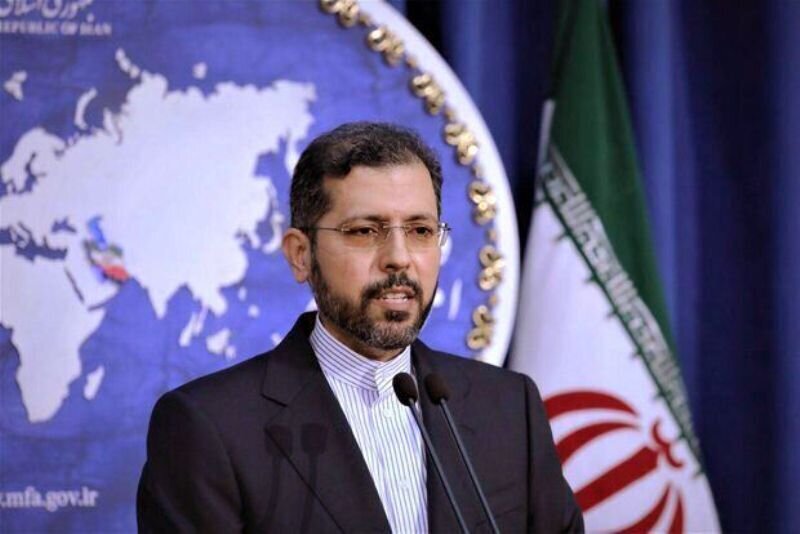Iran says won’t reverse nuclear measures unless U.S. implements UNSCR 2231

TEHRAN – Iran will not back down from the nuclear steps it has taken in response to the United States withdrawal from the 2015 Iran nuclear deal unless the new U.S. administration returns to United Nations Security Council Resolution 2231, Iran’s Foreign Ministry said on Monday.
In a press briefing on Monday, spokesman for Iran’s Foreign Ministry Saeed Khatibzadeh reiterated Tehran’s position on the possible U.S. return to the nuclear deal, officially known as the Joint Comprehensive Plan of Action (JCPOA).
Responding to a question on what Iran would do if the U.S. refrained from lifting sanctions on Iran, the spokesman said nothing new has happened with respect to the JCPOA. “Our position is the same as we previously said: the U.S. and other remaining parties to the JCPOA must lift the sanctions and effectively implement the deal,” he noted.
Nothing will be done by Iran as long as the U.S. doesn’t comply with Resolution 2231, Khatibzadeh remarked.
The spokesman pointed out that if all the sanctions imposed by the Trump administration are lifted and U.S. starts implementing the JCPOA effectively, Iran will reverse all the steps it has taken since the U.S. withdrawal from the JCPOA.
“All of Iran’s measures that were done in accordance with the JCPOA as well as the process of reducing nuclear commitments are reversible,” Khatibzadeh asserted.
He stated that Iran has so far heard a lot of talks but now it’s the time for the U.S. to act.
“If the new U.S. administration is willing [to rejoin the JCPOA], it must show that it’s distancing itself from the previous administration and return to the right path of implementing its commitments,” Khatibzadeh insisted.
Following the U.S. withdrawal from the JCPOA on May 8, 2018, Iran gradually reduced its nuclear commitments, resuming some nuclear activities that were banned by the deal. Iran suspended the implementation of a multitude of obligations in five steps. In early January, Iran also took the most important step of resuming 20% uranium enrichment at the Fordow nuclear plant, where Iran is basically not allowed to spin any kind of centrifuges under the JCPOA.
But Iran said that its nuclear move is reversible if other parties to the nuclear deal return to it.
“We resumed 20% enrichment, as legislated by our Parliament. IAEA has been duly notified. Our remedial action conforms fully with Para 36 of JCPOA, after years of non-compliance by several other JCPOA participants. Our measures are fully reversible upon FULL compliance by ALL,” Foreign Minister Mohammad Javad Zarif said in a tweet on January 4.
The new U.S. president, Joe Biden, had expressed willingness to rejoin the agreement during his election campaign. “I will offer Tehran a credible path back to diplomacy. If Iran returns to strict compliance with the nuclear deal, the United States would rejoin the agreement as a starting point for follow-on negotiations. With our allies, we will work to strengthen and extend the nuclear deal's provisions, while also addressing other issues of concern,” Biden wrote in a September op-ed for CNN.
After he won the U.S. presidential election in November, Biden said he still stood by the views articulated in the op-ed but said that rejoining the nuclear deal would be “hard.”
In a December interview with CNN, Biden echoed the same position, describing the U.S. return to the JCPOA as being “very difficult.”
“He [Trump] has pulled out to get something tougher, and what have they done? They've increased the ability for them to have nuclear material. They’re moving closer to the ability to be able to have enough material for a nuclear weapon. And there’s the missile issues,” Biden said, adding, “All those things, I think, are going to be very difficult. But I know one thing: We cannot do this alone. And that’s why we have to be part of a larger group, dealing not only with Iran, but with Russia, with China and a whole range of other issues.”
However, so far the Biden administration has done nothing to revive the JCPOA.
Several Iranian officials have so far called on the Biden administration to unconditionally return to the JCPOA.
“We expect the new White House officials to unconditionally return to all their previous obligations and commitments,” Rabiei said in an interview with the IRIB news agency in mid-November. “In the first step, sanctions and barriers to the transfer of Iranian money must be lifted and the U.S. administration must be held accountable for the damage it has done to the Iranian people during this period.”
SM/PA
